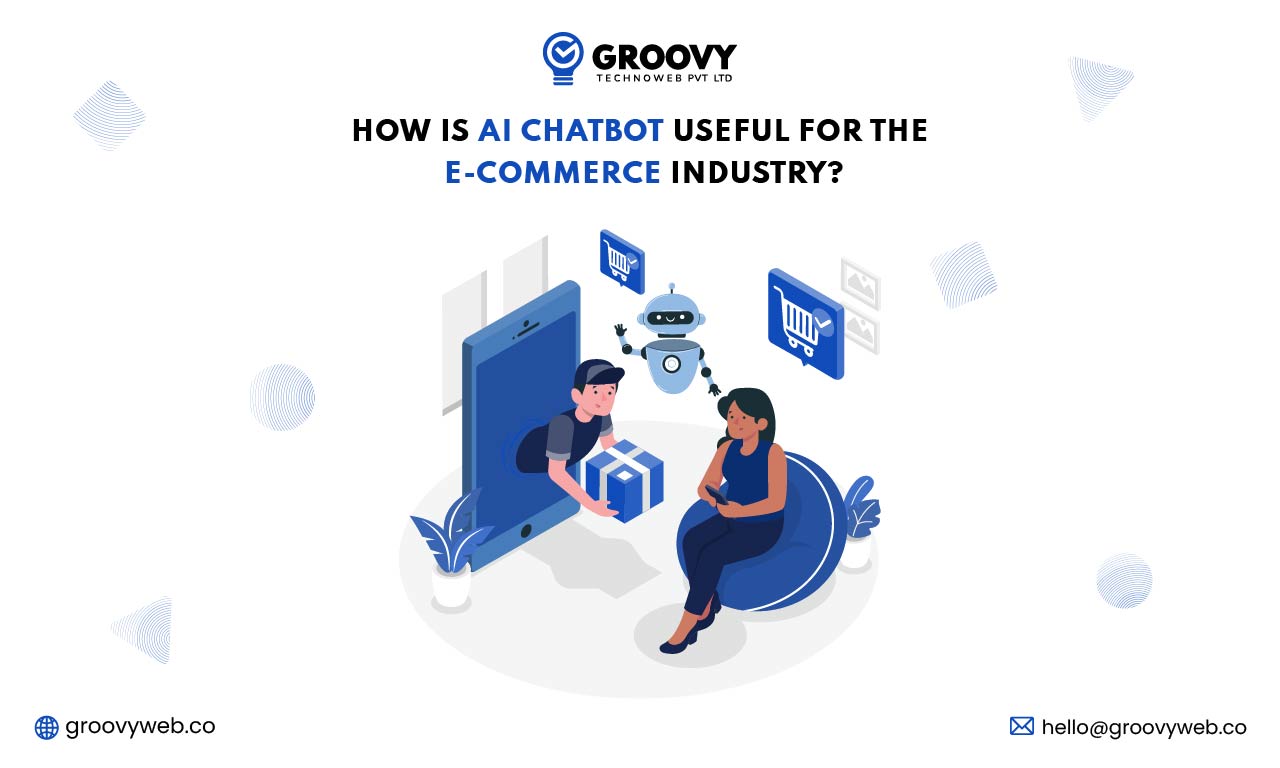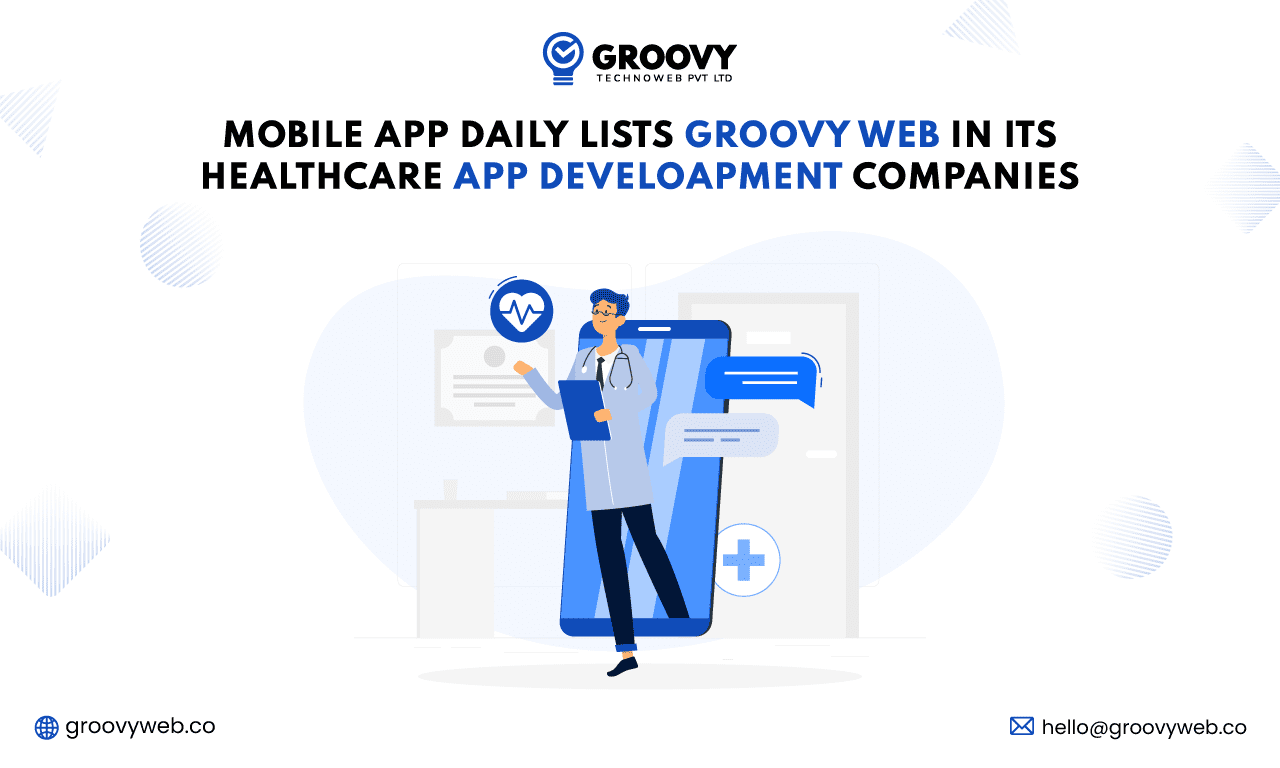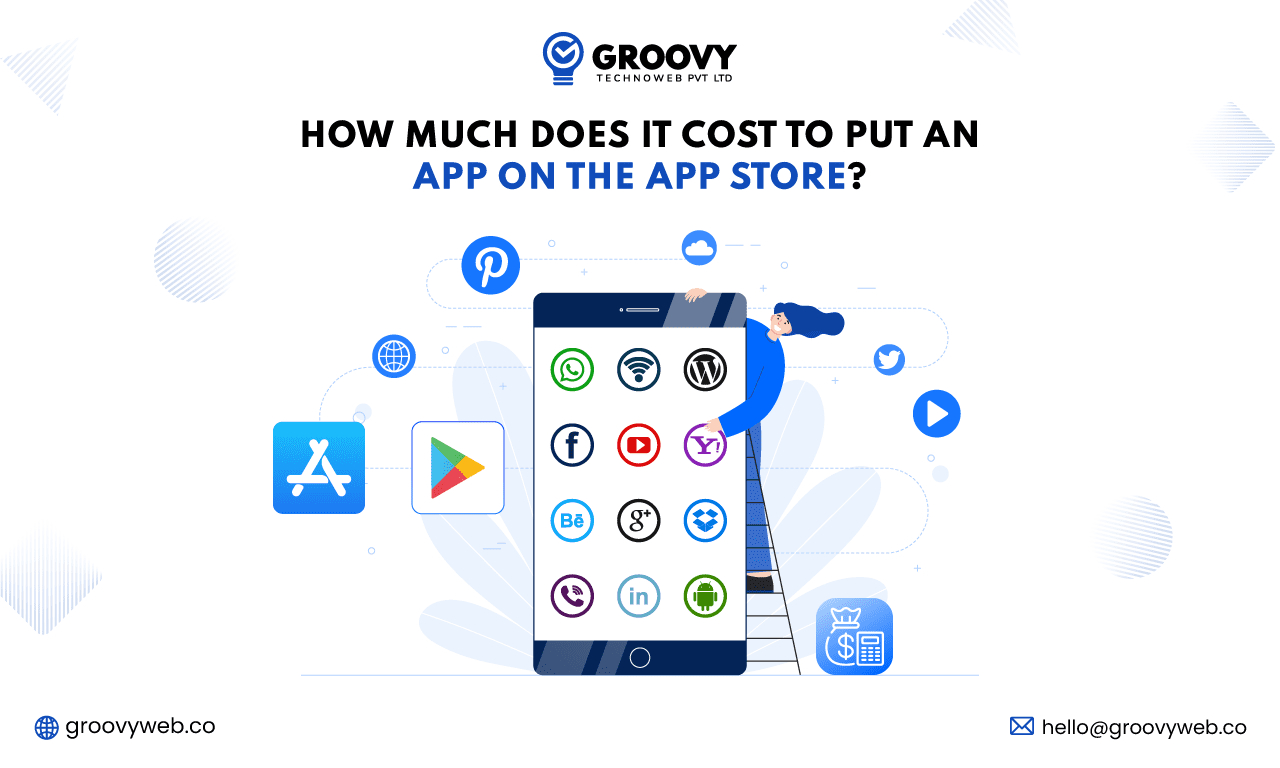How is AI Chatbot Useful for the E-commerce Industry?
Rahul Motwani
March 11, 2025 65 Views
Quick Summary : AI chatbots are remodelling the e-trade enterprise by offering immediate customer support, personalised tips, and seamless shopping reviews. An AI chatbot for e-commerce complements engagement reduces cart abandonment and boosts income via interactive conversations. Features like sentiment analysis, voice activation, and augmented truth integration make chatbots more efficient. A chatbot for e-commerce websites ensures 24/7 assistance, improving patron satisfaction. Additionally, e-commerce AI chatbots streamline operations using automated order monitoring, returns, and price assistance tasks. Businesses can leverage AI chatbot app development services to create custom-designed solutions that beautify consumer interactions, grow conversions, and drive growth in the aggressive online market.
Artificial Intelligence (AI) Integration has significantly progressed the e-commerce region, and AI chatbots have emerged as a crucial issue of this modification. AI chatbots for startups and businesses help improve customer feedback, drive sales, and deliver a 24/7 seamless customer experience. These smart digital assistants enhance customer satisfaction while reducing operational costs.
AI chatbots facilitate a smooth shopping experience in today’s modern digital scenario, increase conversion, and promote permanent customer connections. To be ahead of the competition in the changing virtual economy, e-trade companies must continuously innovate. One such success is using AI chatbots, which have become the necessary tools to increase customer interaction and customize business processes.
In the words of CEO Marc Benioff of Salesforce:- “Artificial intelligence and generative AI may be the most vital era of any lifetime.“
This article delves into the multifaceted benefits of AI chatbots in the e-commerce enterprise, exploring how they revolutionise customer support, increase revenue, and foster customised buying experiences.
What is an AI Chatbot? Definition and How They Work
An AI chatbot is a virtual assistant powered by synthetic intelligence that interacts with users conversationally. These chatbots use Natural Language Processing (NLP) to gain knowledge to understand queries, provide applicable responses, and execute particular obligations. AI chatbots can be rule-based, which means that they follow predefined scripts, or they can be advanced AI-powered bots that learn from interactions. By integrating AI chatbots into their structures, e-commerce organisations can automate customer service, manage transactions, and interact with users via the shopping-for system.
Key Benefits of AI Chatbots for E-commerce Businesses
AI chatbots have transformed the way e-commerce corporations engage with clients. These smart assistants streamline operations, enhance consumer engagement, and optimise sales. Integrating an AI chatbot for eCommerce offers several advantages, from round-the-clock help to personalised buying reviews. Below are a few key benefits that make AI chatbots vital in online retail.
- 24/7 Customer Support
An essential benefit of using an AI chatbot for eCommerce is its ability to provide immediate help anytime. Chatbots don’t require breaks, unlike human marketers, and may handle multiple inquiries simultaneously. Whether it’s product hints, order monitoring, or return requests, chatbots ensure clients get real-time help, improving customer satisfaction and loyalty.
- Cost Efficiency
Implementing a chatbot for an eCommerce internet site can reduce operational costs. Instead of retaining a big customer service crew, groups can depend upon AI chatbots to handle ordinary inquiries, court cases, and troubleshooting. This helps reduce staffing prices even as enhancing reaction instances. Companies can allocate human agents to handle more complex queries, enhancing efficiency.
- Seamless Order Processing
An eCommerce AI chatbot simplifies purchasing by assisting customers in placing orders, tracking shipments, and handling returns. The chatbot allows customers to inquire about product availability, shipping information, and return regulations, eliminating the need for guide intervention. This automation enhances customer experience and reduces operational bottlenecks.
- Lead Generation and Sales Boost
AI chatbots play a vital role in increasing sales and producing leads. By reading user behaviour, chatbots recommend applicable products, permitting powerful upselling and cross-promoting. A nicely programmed AI chatbot for eCommerce can manually guide buyers through the buying process, answer product-related questions, and encourage conversions, resulting in expanded revenue for corporations.
- Personalised Shopping Experience
Personalisation is prime to consumer retention, and eCommerce AI chatbots make it viable. These chatbots analyse beyond buy history, surfing styles, and purchaser possibilities to offer tailored guidelines. By imparting personalised deals and pointers, organisations can improve engagement and inspire repeat purchases, improving client lifetime value.
- Reduced Cart Abandonment
Cart abandonment is a big problem in e-commerce. An AI chatbot for eCommerce helps tackle this problem via sending computerised reminders, imparting coupon codes, and helping clients at some stage in checkout. If a client hesitates, the chatbot can provide real-time answers, resolve doubts, and increase the probability of a hit transaction.
What Are the Pain Points of E-Commerce AI Chatbots?
AI chatbots have transformed online companies by improving patron interactions and streamlining operations. However, despite their advantages, they also present challenges. Many corporations encounter chatbot capability, customer delight, and record security troubles. Understanding those pain factors can help improve the efficiency of an AI chatbot for eCommerce and enhance consumer experience.
- Limited Understanding
One of the largest challenges for an eCommerce AI chatbot is coping with complicated or ambiguous purchaser queries. While AI-powered chatbots are trained to process numerous questions, they’ll conflict with slang, have more than one intent in a single query, or use unusual phrasing. This obstacle can result in misinterpretation, incorrect reactions, and angry customers, affecting the satisfaction and retention of the client.
- Lack of human touch: While AI-powered chatbots can follow human conversations, they often lack emotional intelligence and sympathy. A chatbot for an eCommerce website may not usually understand patron sentiment, mainly impersonal or robotic responses. This absence of human touch can impact consumer pleasure; in reality,75%of clients experience chatbots struggling with complicated troubles and regularly failing to provide accurate answers. Additionally, 68% of consumers trust chatbots need to have an equal level of information and great quality as that of particularly skilled human retailers. Customers seeking personalised help or reassurance may additionally select human dealers over chatbots, affecting ordinary user engagement and satisfaction levels.
- Integration Issues
A chatbot for an eCommerce website has to seamlessly integrate with existing CRM, inventory control, and order processing systems. However, many AI chatbots have compatibility troubles with older structures, leading to disrupted workflows. Poor integration can result in faulty order tracking, behind-scheduled responses, and inefficient customer service, impacting shopping enjoyment.
- Data Privacy Concerns
Customers are increasingly concerned about how AI systems handle their private data. An AI chatbot for eCommerce collects consumer records to customise interactions; however, concerns about data privacy can discourage customers from engaging with it. Businesses should ensure compliance with records protection rules and offer transparency on how client data is stored and used to build trust.
How AI Chatbots Enhance Customer Support and Service
AI chatbots are revolutionising customer support by offering short and accurate responses to inquiries. They can handle many queries concurrently, reducing the burden on human aid teams. Customers can instantly get answers to FAQs, product details, refund policies, and troubleshooting instructions. Moreover, AI-powered bots continuously improve via gadgets by getting to know each other, improving their accuracy and performance over time.
AI Chatbots for Sales and Lead Generation in E-commerce
AI chatbots play an essential function in using income and producing leads. They engage with capability clients, recommend products primarily based on browsing records, and provide personalised offers.
Chatbots additionally assist qualified leads by collecting consumer statistics, ensuring corporations interact with the most promising prospects. E-trade platforms can boost conversion rates and sales by automating income conversations.
Personalisation and AI Chatbots: Enhancing User Experience
Personalisation is key to customer delight, and AI chatbots excel at providing tailored experiences. By reading patron behaviour, preferences, and purchase records, chatbots can suggest relevant products, offer distinctive discounts, and provide customised guidelines. This degree of personalisation complements personal engagement, fosters loyalty, and improves overall buying experiences.
AI Chatbots for Order Management and Post-Purchase Engagement
Managing orders and supplying a submit-buy guide is vital in e-commerce. AI chatbots help customers monitor shipments, edit orders, process refunds, and address delivery concerns. Additionally, chatbots can observe clients put up-buy by inquiring for feedback, suggesting complementary merchandise, and sending reminders for repurchases. This guarantees a continuing post-purchase enjoyment and strengthens patron retention.
AI Chatbots for Marketing and Customer Retention
AI chatbots are revolutionising e-commerce advertising strategies. They engage clients through interactive messaging, offer promotional offers, and assist in loyalty programs. Businesses use chatbots to send personalised e-mail campaigns, SMS reminders, and targeted advertisements.
By keeping customers engaged and informed, chatbots contribute to higher retention costs and long-term brand loyalty.
Challenges and Limitations of AI Chatbots in E-commerce
AI chatbots have revolutionised online agencies, enhancing client interactions and automating strategies. However, they are no longer without demanding situations. While an AI chatbot for eCommerce can enhance performance, it also has obstacles that affect consumers’ experience in commercial operations. Understanding these challenges is vital to optimising the chatbot’s overall performance.
- Language and Context Limitations
One of the major limitations of an eCommerce AI chatbot is its war with information, human language, and context. Chatbots regularly understand questions incorrectly, mainly due to unfair reactions. Unlike human retailers, they lack emotional intelligence, making it difficult to deal with complex or fine interactions successfully. Businesses want to teach chatbots continuously to improve their relevance and accuracy.
- Technical Glitches
Technical issues can negatively affect the overall performance of a chatbot for an eCommerce website. Poorly programmed chatbots may cause reaction delays, fail to process requests well, or offer incorrect records. These system faults can frustrate customers and reduce system consideration. Ensuring the right integration and regular upkeep can help decrease these errors.
- Customer Resistance
Despite advancements, many users nonetheless opt for human interplay over chatbot-based help. Some customers can also feel uncomfortable or dissatisfied with computerised responses, especially in complicated queries in which non-public touch subjects. Organisations must offer a seamless transition from chatbot support to human dealers when needed to conquer this resistance.
- Regular Updates Required
A chatbot for an eCommerce website calls for consistent updates and training to remain powerful. Consumer conduct, language styles, and product info often trade, making previous chatbots inefficient. Regular improvements and AI education are vital for retaining accuracy and relevance in responses, ensuring a better consumer revel.
Future Trends: The Evolution of AI Chatbots in E-commerce
The evolution of AI is remodelling how organisations interact with clients, and AI chatbots for e-commerce are at the forefront of this shift. With AI, NLP, and automation improvements, chatbots are getting smarter, customised, and deeply integrated into online purchasing experiences. Let’s discover the key traits shaping the future of e-trade chatbots.
- Voice-Activated Chatbots
The rise of voice search affects chatbot development, allowing spontaneous integration with digital assistants such as Alexa and Google Assistant. This advancement allows hands-free buying stories, where customers can effortlessly ask about products, check order statuses, or get pointers. A chatbot for e-commerce website sites with voice talents complements accessibility and improves purchaser engagement.
- Hyper-Personalization
With AI and deep getting-to-know, chatbots are set to deliver tremendously customised interactions. They analyse surfing history, beyond purchases, and consumer alternatives to advise merchandise tailored to character wishes. E-commerce AI chatbot solutions will make purchasing more intuitive, enhancing consumer pleasure and growing conversion rates through correct and facts-pushed personalisation.
- Integration with Augmented Reality (AR)
AI chatbots are advancing beyond text-based interactions by integrating with AR technology. This permits clients to browse for merchandise, such as clothing, accessories, or makeup, before buying. Combining AR and a chatbot on an e-commerce website will create an immersive buying experience, reducing return prices and boosting consumer confidence.
- Advanced Sentiment Analysis
Understanding customer feelings is vital to improving customer support. AI chatbots are evolving to locate sentiments through textual content and voice inputs, permitting them to respond with empathy. With advanced sentiment evaluation, an AI chatbot for e-commerce can offer better resolutions, construct more potent client relationships, and enhance customer consideration in online shopping.
Groovy Web is a main issuer of AI chatbot solutions for e-trade companies. Their modern chatbot development services assist organisations in decorating patron engagement, automation procedures, and power sales. By leveraging modern-day AI technology, Groovy Web ensures e-commerce systems live competitively in the evolving digital landscape.
Conclusion: The Impact of AI Chatbots on E-commerce Growth
AI chatbots have become game-changers for e-commerce companies, offering extraordinary efficiency, personalisation, and automation. From customer service to advertising and income, these smart bots streamline operations and improve personal experiences. While challenging situations remain, continuous improvements in AI will similarly refine chatbot talents. As organisations embrace AI-driven solutions like those presented using Groovy Web, the e-commerce enterprise will continue to thrive, providing clients with faster, smarter, and more personalized purchasing stories.
Written by: Rahul Motwani
Rahul Motwani is an experienced Project Manager with a demonstrated history of working in the information technology and services industry. He started his career as a Backend developer and currently has his hands-on managing projects at Groovy Web. He is a strong program and project management professional with a Bachelor's degree focused on Computer Application.
Frequently Asked Questions
We hope these clear your doubts, but if you still have any questions, then feel free to write us on hello@groovyweb.coCan an AI chatbot increase sales in an e-commerce store?
Yes, AI chatbots analyse purchaser behaviour and choices to offer personalised product guidelines. A chatbot for an e-commerce website engages users with centred promotions, upselling, and pass-selling strategies. Chatbots beautify conversion fees and enhance revenue for e-commerce businesses by guiding clients via shopping for adventure.
How do AI chatbots enhance user engagement in online shopping?
AI-powered chatbots keep clients engaged with interactive conversations, actual-time product tips, and customised purchasing help. An e-commerce AI chatbot can send proactive notifications regarding discounts, restocked items, and order updates. It encourages the procurement of frequent engagement repeats and strengthens customer loyalty in the competitive e-commerce market.
How do AI chatbots help in reducing cart abandonment?
Cart abandonment is a main assignment in e-commerce. AI chatbots send timely reminders, offer customised reductions, and help with checkout troubles. With capabilities like automated compliance with state fee assistance, a chatbot for e-commerce website sites helps get better-misplaced income by encouraging customers to finish their purchases.
What are the benefits of AI chatbot app development services for e-commerce?
Professional AI chatbot app development services ensure the deployment of smart, scalable, and customised chatbots tailored to business needs. These services help automate operations, enhance consumer interactions, and integrate chatbots with CRM and payment systems. A properly evolved chatbot streamlines workflows and enhances the overall shopping experience for e-trade customers.
Related Blog

Kartik Bhaviyash
MobileAppDaily Lists Groovy Web in its Healthcare App Development Companies 2023
Achivements 13 Nov 2024 2 min read
Krunal Panchal
Groovy Web Recognized As Industry Leader In India By Team App Development
Achivements 09 Jan 2025 3 min read
Rahul Motwani
How Much Does It Cost to Put an App on the App Store
Mobile App Development 14 Nov 2024 15 min readSign up for the free Newsletter
For exclusive strategies not found on the blog